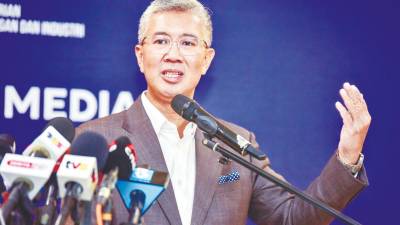KUALA LUMPUR: Malaysia has declined requests from the United States to eliminate excise duties on automobiles, tobacco and alcohol, as well as to waive import licensing requirements and fully liberalise equity ownership in strategic sectors during recent tariff negotiations.
Investment, Trade and Industry Minister Tengku Datuk Seri Zafrul Abdul Aziz said the outcome of the negotiations did not cross any of Malaysia’s “red lines” or compromise its sovereign interests.
“In ensuring our domestic industries are protected and given sufficient space and opportunity to grow, we stood firm. We did not compromise,” he said at a media briefing today.
Among the key demands from the US, he said, was the removal of excise duties.
“Excise duties in Malaysia apply to three main categories: automobiles, tobacco, and alcohol,” he explained.
“These duties are part of our domestic protection policy, particularly for the automotive sector, which we view as a strategic industry vital to our economy. In this context, maintaining these duties is a matter of national interest.”
While acknowledging that the US similarly considers the automotive industry significant, Tengku Zafrul underscored that Malaysia would not accede to calls for greater market openness at the expense of its strategic sectors.
“That was a red line for us,” he said.
Malaysia also chose to maintain its requirement for import permits on US products. “We stood our ground and will continue to require import permits,” Tengku Zafrul affirmed.
He added that Malaysia also rejected proposals for full liberalisation of equity ownership in key strategic sectors.
“We did not proceed with that,” he said.
Other sensitive areas highlighted included the imposition of export duties and blanket exemptions from import licensing for US goods. “These were among the core issues related to our national economic and security priorities,” he noted.
On commercial cooperation, Tengku Zafrul reaffirmed Malaysia’s earlier commitments, including the planned purchase of Boeing aircraft. “We’ve committed to acquiring 30 Boeing aircraft in the first phase, and an additional 30 in the second phase. We’ve reiterated that commitment.”
Malaysia presented the US with a comprehensive tariff proposal covering 98% of all tariff lines, Tengku Zafrul said. “In other words, we offered a broad and inclusive package encompassing nearly all tariff categories.”
Out of 11,260 tariff lines requested by the US, Malaysia agreed to set 6,911 lines – about 61% – at zero duty.
“We believe certain industries are still not ready for full liberalisation, so we have taken a measured approach,” he added.
The negotiations also addressed non-tariff barriers as part of Malaysia’s broader effort to position itself as a trade- and investment-friendly economy.
“We’ve implemented several progressive enhancements to facilitate trade and investment, benefiting both local and international stakeholders,” Tengku Zafrul said.
He confirmed that exports of Malaysian semiconductor and pharmaceutical products to the US would remain exempt from the new tariffs. “At this stage, exports of semiconductors and pharmaceuticals will continue to enjoy zero tariff,” he said.
A joint statement on the final tariff arrangement between Malaysia and the US is expected to be issued this weekend.
The new 19% tariff on certain Malaysian goods is scheduled to take effect on Aug 8.
